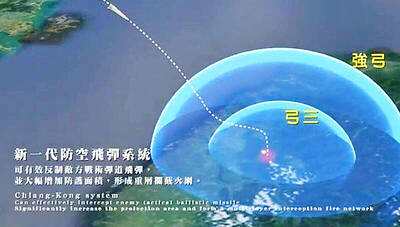Leading US senators expressed alarm on Thursday at the scale and speed of China’s land reclamation in the South China Sea and said a formal US strategy was needed to slow or stop the work.
In a letter to US Secretary of State John Kerry and US Secretary of Defense Ash Carter, Republican Senators John McCain and Bob Corker and Democrats Jack Reed and Bob Menendez said that without a comprehensive strategy, “long-standing interests of the United States, as well as our allies and partners, stand at considerable risk.”
They said China’s land reclamation and construction in the South China Sea’s Spratly archipelago (Nansha Islands, 南沙群島) gives it the potential to expand its military reach and is “a direct challenge, not only to the interests of the United States and the region, but to the entire international community.”
The letter said Gaven Reef (Nansyun, 南薰礁) had grown about 114,000m2 in size in the past year and previously submerged Johnson Reef (Chigua Reef, 赤瓜礁) was now a 100,000m2 “island.” Fiery Cross Reef (Yongshu Reef, 永暑礁) has increased in size more than 11-fold since August last year.
“While other states have built on existing land masses, China is changing the size, structure and physical attributes of land features themselves,” the letter said. “This is a qualitative change that appears designed to alter the status quo in the South China Sea.”
It said any attempt by China to militarize the artificial islands could have “serious consequences” and could embolden Beijing to declare a new air defense zone in the South China Sea.
The senators, who head the Senate Armed Services Committee and the Senate Foreign Relations Committee, said the strategy should lay out “specific actions the United States can take to slow down or stop China’s reclamation activities.”
Chinese Ministry of Foreign Affairs spokesman Hong Lei (洪磊), when asked about the letter, said China’s activities in the South China Sea were “fair, reasonable and legal.”
“We have a right to do this,” Hong added, without elaborating.
China claims about 90 percent of the potentially energy rich South China Sea. Taiwan, Vietnam, Malaysia, Brunei and the Philippines also have overlapping claims.
Chinese reclamation work is well advanced on six Spratly reefs and workers are building ports and fuel storage depots and possibly two airstrips. Experts say this will not overturn US regional military superiority, but could allow Beijing to project power deep into the maritime heart of Southeast Asia.

LIMITS: While China increases military pressure on Taiwan and expands its use of cognitive warfare, it is unwilling to target tech supply chains, the report said US and Taiwan military officials have warned that the Chinese People’s Liberation Army (PLA) could implement a blockade within “a matter of hours” and need only “minimal conversion time” prior to an attack on Taiwan, a report released on Tuesday by the US Senate’s China Economic and Security Review Commission said. “While there is no indication that China is planning an imminent attack, the United States and its allies and partners can no longer assume that a Taiwan contingency is a distant possibility for which they would have ample time to prepare,” it said. The commission made the comments in its annual

DETERMINATION: Beijing’s actions toward Tokyo have drawn international attention, but would likely bolster regional coordination and defense networks, the report said Japanese Prime Minister Sanae Takaichi’s administration is likely to prioritize security reforms and deterrence in the face of recent “hybrid” threats from China, the National Security Bureau (NSB) said. The bureau made the assessment in a written report to the Legislative Yuan ahead of an oral report and questions-and-answers session at the legislature’s Foreign Affairs and National Defense Committee tomorrow. The key points of Japan’s security reforms would be to reinforce security cooperation with the US, including enhancing defense deployment in the first island chain, pushing forward the integrated command and operations of the Japan Self-Defense Forces and US Forces Japan, as

‘TROUBLEMAKER’: Most countries believe that it is China — rather than Taiwan — that is undermining regional peace and stability with its coercive tactics, the president said China should restrain itself and refrain from being a troublemaker that sabotages peace and stability in the Indo-Pacific region, President William Lai (賴清德) said yesterday. Lai made the remarks after China Coast Guard vessels sailed into disputed waters off the Senkaku Islands — known as the Diaoyutai Islands (釣魚台) in Taiwan — following a remark Japanese Prime Minister Sanae Takaichi made regarding Taiwan. Takaichi during a parliamentary session on Nov. 7 said that a “Taiwan contingency” involving a Chinese naval blockade could qualify as a “survival-threatening situation” for Japan, and trigger Tokyo’s deployment of its military for defense. Asked about the escalating tensions

INTERCEPTION: The 30km test ceiling shows that the CSIST is capable of producing missiles that could stop inbound missiles as they re-enter the atmosphere Recent missile tests by the Chungshan Institute of Science and Technology (CSIST) show that Taiwan’s missiles are capable of intercepting ballistic missiles as they re-enter the atmosphere and pose a significant deterrent to Chinese missile threats, former Hsiung Feng III missile development project chief engineer Chang Cheng (張誠) said yesterday. The military-affiliated institute has been conducting missile tests, believed to be related to Project Chiang Kung (強弓) at Pingtung County’s Jiupeng Military Base, with many tests deviating from past practices of setting restriction zones at “unlimited” and instead clearly stating a 30.48km range, Chang said. “Unlimited” restrictions zones for missile tests is